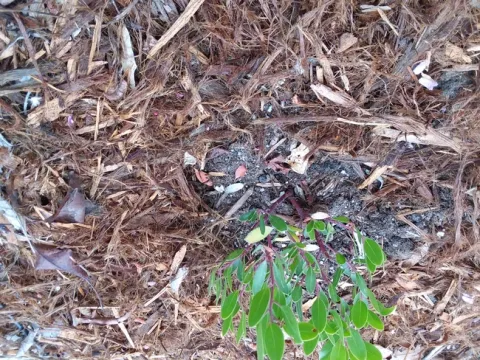
Mulch
By Polly Nelson UCCE Master Gardener
Want to Conserve Water? Mulch Your Planting Areas
Water conservation is the major reason to mulch your landscape. Mulch is any material, organic and inorganic, that covers the soil but is not mixed in. Covering bare soil moderates soil temperature and creates a buffer to reduce water evaporation. Less water lost to evaporation, means more water for your plants.
The benefits of mulch are many. Weed suppression - blocking sunlight impedes weed germination, and if airborne weed seeds land, the roots will have difficulty taking hold. Fallen leaves and other organic mulches break down over time and add nutrients back into the soil. A newly mulch garden bed also simply improves curb appeal.
Straw, common in vegetable gardens, will break down and provide soil nutrients and food for worms. Cover with a more stable mulch if needed for windy conditions. Wood bark comes in varying sizes and shapes. Large pieces decay slowly but do not provide significant nutrients. Smaller sized wood chips help retain soil moisture but break down faster. Shredded wood mulches decompose the quickly, but the fine texture works well for weed control and overall coverage.
Check for products that use non-toxic dyes if decorative color bark is desired in edible gardens. Rubber bark, recycled shredded tires, may leach toxic chemicals, harming soil, plants, and nearby water sources.
Organic mulch offers the greatest range of benefits, but inorganic mulch (like gravel, stones, and pebbles) are also common choices that withstand heavy foot traffic. However, the weight of the stone coupled with the transfer of heat to the soil may damage roots, especially with young plants. Additionally, these inorganic mulches do not break down and offer no additional organic matter to the soil.
Apply mulch after carefully removing weeds. Apply a 2–4-inch layer, keeping clear of plant stems and tree trunks while making sure drip emitters are accessible. Fine-textured mulches will be more compact and can be applied at a shallower depth. Replenish the mulch periodically as it decomposes.
Mulch can help you conserve water and reduce your water bill by making sure the water you provide does not evaporate, while at the same time decreasing weed germination and adding beneficial organic matter to the soil.
For more information:
https://anrcatalog.ucanr.edu/pdf/8672.pdf
http://sonomamg.ucanr.edu/Sonoma_Gardener_Articles/Mulch--a_Gardeners_Best_Friend/
Have you thought about becoming a Master Gardener? Go to http://ucanr.edu/mgclassof2022 for information and an application.
We are still here!!!
No in-person workshops for now, but you can view workshops on:
Instagram live at slo_mg or visit our You Tube channel
at “San Luis Obispo County UC Master Gardeners”.
Visit our website; https://ucanr.edu/sites/mgslo/
or email us at anrmgslo@ucanr.edu
Our physical offices are closed, but you can still call or email questions:
San Luis Obispo 805-781-5939
Arroyo Grande 805-473-7190
Templeton 805-434-4105

